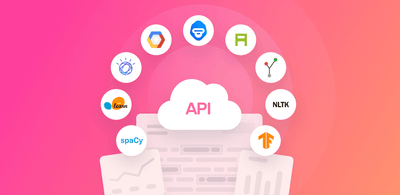Text Analysis Tools: The Complete List for 2022

Text analysis, also known as text mining and text analytics, is the process of transforming text into data that machines can understand, process, and interpret, to deliver valuable insights.
What is a Text Analysis Tool?
From extracting keywords or entities to classifying text by sentiment, topic, and intent, text analysis tools help companies make better decisions.
You can build your own text analysis tools using open-source libraries – or buy a ready-made solution.
Not everyone will have an in-house team of machine learning experts, which you'll need to build text analysis tools. Even if you do, you’ll want to start reaping the benefits of text analysis tools right away – not so easy when you’re building complex AI tools from scratch.
The good news is that there are many great SaaS tools on the market, neatly packaged and ready to use. They’re a lot more affordable than building your own text analysis tools, and just as powerful, too. Most are extremely easy to use (even for those who don't know how to code) so anyone can power up their apps, daily tasks, and decision-making with text analysis.
Check out our list of the text analysis tools that you can start using right away.
The 8 Best Text Analysis Tools for 2022
- MonkeyLearn | Create custom text analysis models
- Aylien | Powerful API for text analysis
- IBM Watson | Advanced text analytics
- Thematic | Analyze customer feedback at scale
- Google Cloud NLP | Train your own Machine Learning model
- Amazon Comprehend | Pre-trained NLP models
- MeaningCloud | Extract insights from unstructured text data
- Lexalytics | Text analytics libraries
1. MonkeyLearn
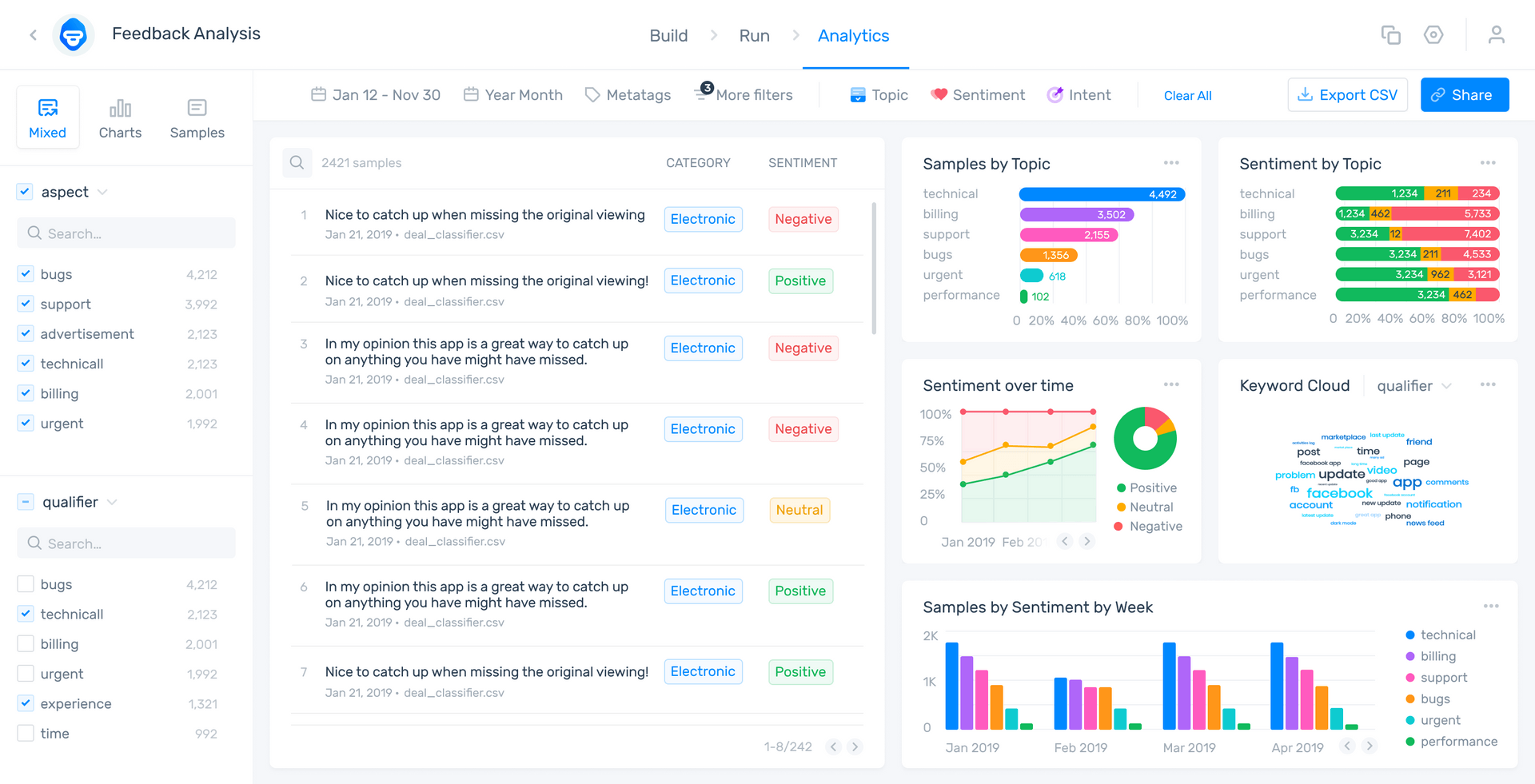
MonkeyLearn is an easy-to-use, yet powerful, machine learning tool that focuses on automatically analyzing text and extracting actionable insights from data. You can use pre-trained text analysis models or create your own – and tailor them to your needs for higher levels of accuracy.
Text analysis models include text classifiers and text extractors, giving you the opportunity to perform sentiment analysis, keyword extraction, intent classification, language detection, and much more, in a matter of seconds.
Don’t worry if you’re new to text analysis tools. MonkeyLearn is a low-code, no-code machine learning platform, with a point and click interface, making it easy to create your own text analysis tools. And you’ll find key integrations with everyday apps like Excel, Google Sheets, Zapier, RapidMiner, and Zendesk, giving you direct access to your data.
For those who know how to code, MonkeyLearn API is available in all major programming languages, so you can seamlessly connect MonkeyLearn’s text analysis models to the tools you already use.
Pricing: Check out plans and pricing.
2. Aylien
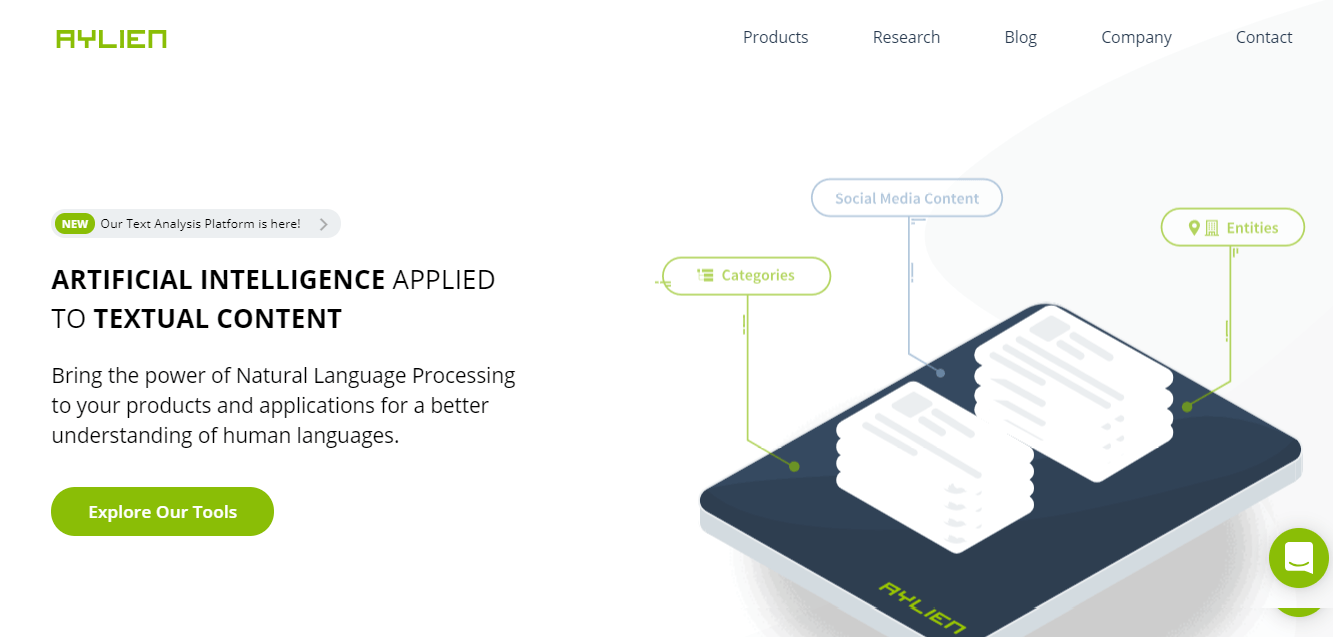
Aylien is a favorite among developers as a business intelligence solution. It focuses on extracting value from text by making use of artificial intelligence, natural language processing, and machine learning. If you want to improve your strategies, from customer support to brand development, Aylien can help you gain the insights you need to make data driven decisions and build comprehensive strategies.
How? Well, Aylien’s modus operandi is to collect and understand data so machine learning models can label it, process it, and ultimately interpret it via different text analysis methods.
Centered around easy, effective, and powerful APIs for text analysis, Aylien offers models that perform social sentiment analysis, entity extraction, content aggregation, language detection, batch processing, topic discovery, automatic hashtagging, and more.
Besides its text analysis API, Aylien also offers a news API that makes it easy to aggregate, search and understand news articles at scale. The good news is that you can set up this API in minutes using Aylien’s SDKs, available in seven major programming languages.
3. IBM Watson

Tech giant IBM offers a collection of AI tools that extract and classify information within structured or unstructured text data. Useful tools include IBM Watson Natural Language Understanding & Classifier, Watson Personality Insights, and the Watson Tone Analyzer.
IBM Watson Natural Language Understanding extracts concepts, entities, keywords, and categories, to name a few. When used to perform sentiment analysis, it not only sorts text into generic sentiment buckets – positive, negative, and neutral – it also sorts these sentiments by distinct emotions, such as confused, excited, sad, confident, etc.
The IBM Watson Natural Language Classifier enables developers to extract meaning from text and assign a classification – without needing to be an expert in machine learning or statistical algorithms. Developers can create their custom machine learning model by uploading their data, and let the model classify texts, extract insights, and identify trends.
IBM Watson Personality Insights is an industry favorite for its ease of use and focus on understanding customers’ personality traits. Models include:
- Big Five. Describes how a person engages with the world by focusing on five dimensions that help characterize an individual.
- Needs. Describes which aspects of a product resonate with a person by identifying characteristics such as excitement, curiosity, self-expression, challenge, etc.
- Values. Describes motivating factors that influence a person's decision making, from self-transcendence/helping others to self-enhancement/achieving success.
Finally, the Watson Tone Analyzer uses linguistic analysis to detect emotion (happy, sad, angry, scared, etc) tendencies (openness, conscientiousness, extroversion, agreeableness, emotional range), and language style (confident, hesitant, analytical, assertive, etc).
4. Thematic
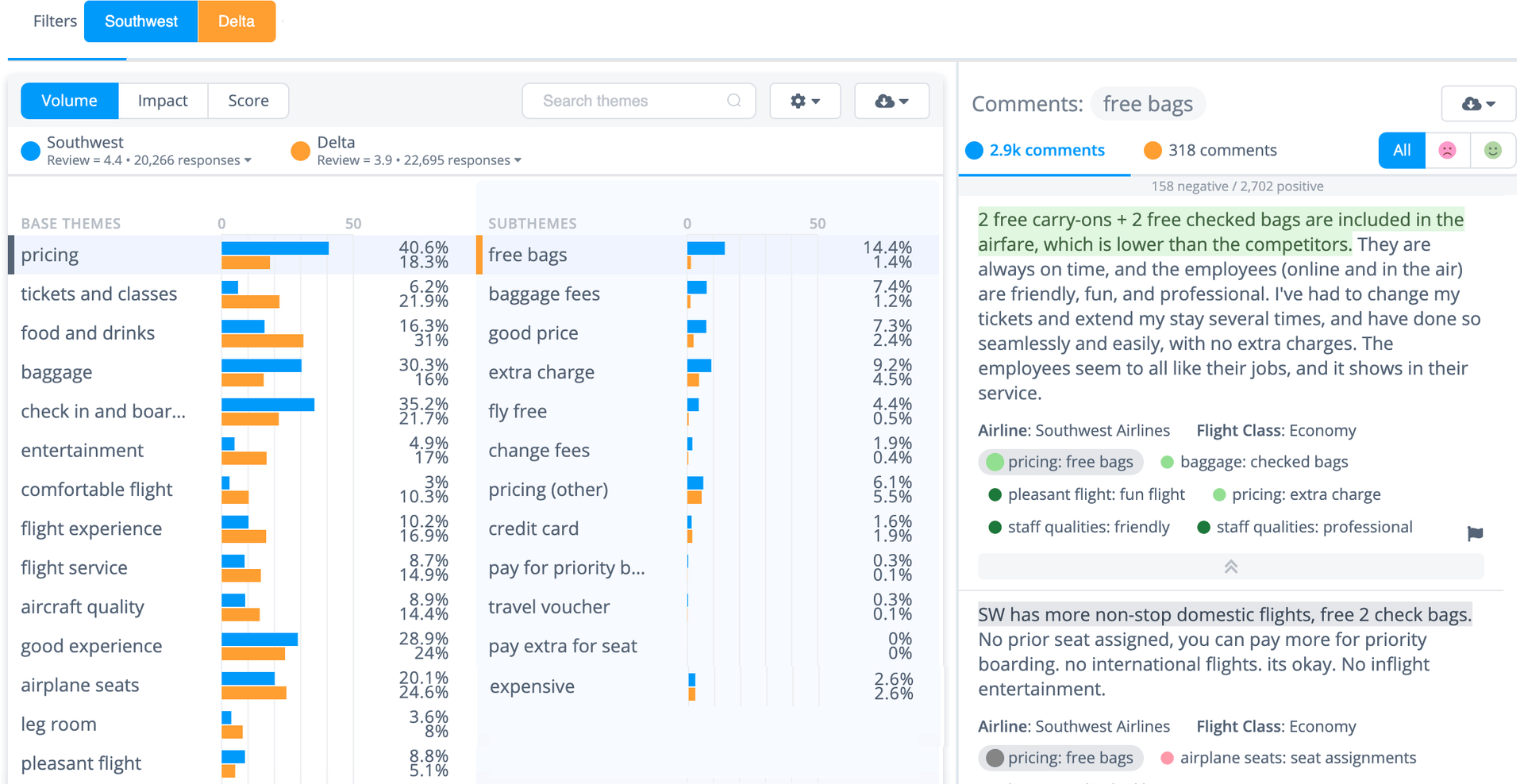
Thematic is designed to analyze customer feedback using artificial intelligence, i.e., natural language processing and deep learning.
The platform offers three AI tools: Thematic Intelligence, Thematic Insights, and Thematic Catalyst. Thematic Intelligence deals with the actual extraction of meaning in texts, grouping content into themes, Thematic Insights delivers results relating to trends and patterns in your themes, and Thematic Catalyst enables you to create data visualizations.
Thematic works seamlessly with tools you already use – SurveyMonkey, Zendesk, internal databases, or any NPS provider you use – so you can set up a working model in less than a day.
5. Google Cloud NLP

Not one to be left behind, Google’s solution to the growing text analysis trend is delivered in the form of Google Cloud NLP. This tool helps businesses find meaning in unstructured text and gain insights.
Google Cloud NLP focuses on different text analysis applications, such as entity extraction, syntax analysis, sentiment analysis, and content classification. If you’re keen to train your own machine learning models, all you’ll need is some training data to fine-tune your models to your domain-specific keywords, sentiments, and topics, etc.
One last perk! You can integrate Google’s AI tools with your Cloud Storage, creating a seamless text analysis experience.
6. Amazon Comprehend

Amazon Comprehend offers you the chance to use pre-trained NLP-powered models or customize your own. Either way, you’ll be able to mine phrases and entities in your unstructured data, evaluate texts using attributes and scoring mechanisms, and sort text by sentiment, topic, and more.
If you do decide to train your own models to identify specific terms, you’ll be able classify documents and messages in a way that makes sense for your business. No machine learning expertise is needed to customize your own models; you simply define your labels and train your models with a small set of example text.
7. MeaningCloud
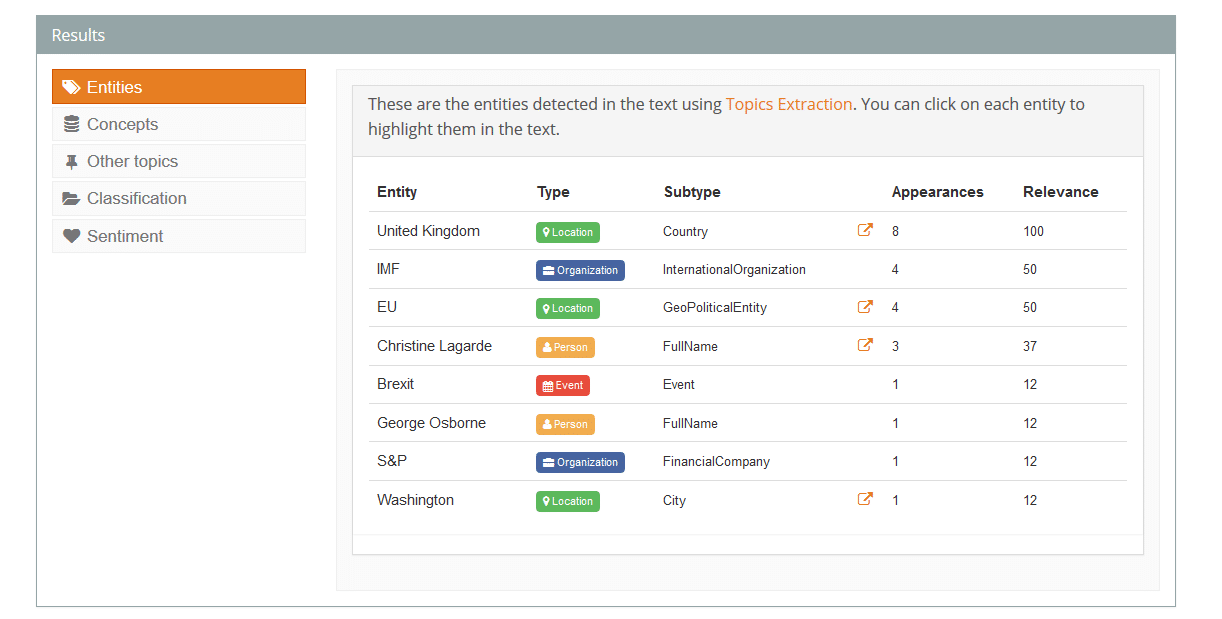
MeaningCloud is a SaaS text analytics solution that automates the process of extracting insights from unstructured data. MeaningCloud is easy to use as it offers integrations with popular tools such as Excel, Google Sheets, RapidMiner, and Zapier.
With an array of models that include automatic summarization, corporate reputation, deep categorization, document structure analysis, sentiment analysis, text classification, text clustering, and topic extraction, MeaningCloud offers both cloud-based APIs and graphic interfaces to perform text analysis tasks.
You can add dictionaries to your APIs, to help models focus on aspects/features of a particular product, proofread technical texts without having to manually ignore the more specific terms that are not included in basic dictionaries, and extract the mentions of entities and concepts in a text assigning them a value from your own ontology.
In addition, MeaningCloud offers on-premise options to help you deal with strict privacy regulations or highly-sensitive data.
Last but not least, MeaningCloud offers vertical packs, resources that are customized for a specific app or industry. For example, the Voice of Customer vertical pack includes resources or components that are tailored for those in banking, insurance, telco, retail, etc.
8. Lexalytics

Lexalytics is a modular platform solution that hosts three text analysis tools: Salience (on-premise NLP), Semantria (Cloud NLP), and SSV (Storage & Visualization).
Salience is a great on-premise solution offering text analytics libraries that easily integrate with users’ applications. Salience offers sentiment analysis, named entity extraction, theme extraction, categorization, intent analysis, summarization, tokenization, part-of-speech tagging, and language recognition.
Semantria is the cloud-based API for text analytics and natural language processing, and allows users to perform the same functions as Salience.
Embedded in Semantria, SSV stores, manages, and analyzes unstructured text documents to generate dashboards and reports that focus on trends, patterns, and the drivers behind specific text opinions.
Final Note on Text Analysis Software
Text analysis tools make it cost-effective, hassle-free, and accurate to analyze customer data in next to no time.
There is no need for you to set up complex infrastructure, invest in a team of machine learning experts, or wait months before you can reap the benefits – SaaS text analysis tools are ready to use in minutes.
Discover MonkeyLearn and start using our powerful, easy-to-use, and affordable tools right away.

Federico Pascual
March 6th, 2020






